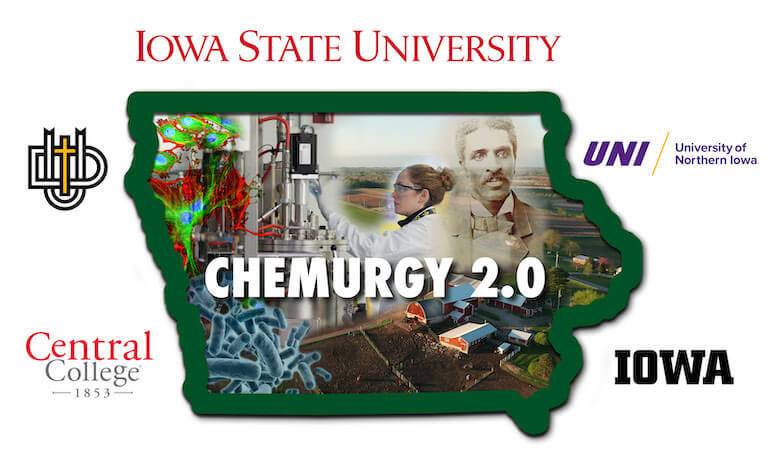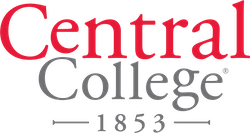Iowa Universities and Colleges Partner to Bolster Advanced Biomanufacturing in the State
Posted May 24, 2023

Posted May 24, 2023

Around the turn of the 20th century, George Washington Carver – Iowa State University’s first African American student and faculty member – had a vision that materials for every human need could be synthesized from things that grow. Carver coined the term Chemurgy to describe the use of applied chemistry to produce industrial products from agricultural materials.
Today, in the first quarter of the 21st century, Carver’s vision resonates more than ever as researchers at all three Iowa Regents’ universities and two primarily undergraduate in-state institutions have come together to launch Chemurgy 2.0 – the shorthand designation of a major initiative that will position Iowa as a national leader in biomanufacturing.
The formal project, entitled Building Capacity Across Iowa to Meet Human Needs from Things That Grow, was recently announced as one of six new EPSCoR projects by the National Science Foundation (NSF). EPSCoR stands for Established Program to Stimulate Competitive Research, which is intended to advance scientific progress and elevate discovery nationwide.
The Iowa EPSCoR project brings together researchers from Iowa State University in Ames, the University of Iowa in Iowa City, the University of Northern Iowa in Cedar Falls, Central College in Pella and Dordt University in Sioux Center.
The partners’ collective vision for Chemurgy 2.0 is to go beyond just chemistry – using an array of basic and applied sciences, biological systems and advanced manufacturing techniques – to produce: Plastics for Additive Manufacturing (PAM); Fibers for Flexible and Rigid (FFR) materials; and Proteins for Diagnostics and Therapeutics (PDT). The project is designed to enhance research capacity and infrastructure for Iowa’s bioscience and advanced manufacturing industries while also supporting the development of a diverse, skilled, advanced biomanufacturing workforce.
“Our EPSCoR team has a vision that by the end of the award, Iowa will have established sustainable, externally funded collaborations among bioscience and advanced manufacturing researchers throughout the state,” said Laura Jarboe, the Cargill Professor in Chemical Engineering at Iowa State and the EPSCoR project leader. “We will have increased research infrastructure and productivity in the basic and applied science and engineering fields, along with data science that supports these disciplines. We will have disseminated educational systems and tools to address workforce availability concerns and expand participation of underrepresented groups throughout the state, including first-generation and rural students.”
Iowa State serves as the lead institution on the EPSCoR project. The university is well-positioned for the role based on its extensive infrastructure that supports work in the biosciences:
“We’re excited to serve as the lead institution. However, the ultimate impact of a project of this magnitude hinges on successful partnerships – collaborating with institutions and researchers that share a common vision and bring the diverse skills and expertise needed to make that vision a reality,” said Iowa State Vice President for Research Peter Dorhout. “Working together, the partner institutions and collective research team will chart and execute a course that will create a lasting impact by making Iowa an epicenter for biomanufacturing.”
Each partner institution plays a vital role in this EPSCoR initiative. Here are insights from the leads and/or key collaborators from each participating university and college.
Monomers are the building blocks of polymers. In his lab on the Central College campus, Jay Wackerly, associate professor of Chemistry, will work to synthesize value-added monomers and create polymers from inexpensive agricultural feedstocks like corn and soybeans. The result will be access to a potentially vast array of plastics for a wide range of uses. The project also allocates funds to support establishing a polymer analysis site at Central College. This will support research and development activities in South Central Iowa, with an eye on facilitating formation of more bioplastic startup companies in the area.
 “I hope the lasting impact of this grant is to get more young Iowans interested in and knowledgeable about the future of agriculturally derived materials,” Wackerly said. “This is a growing industry sector within the state, so it would be ideal to train Iowans, who have grown up in a culture so integrated with farms and farming, to utilize agricultural products to make new materials as well as materials that can replace those currently derived from petroleum.”
“I hope the lasting impact of this grant is to get more young Iowans interested in and knowledgeable about the future of agriculturally derived materials,” Wackerly said. “This is a growing industry sector within the state, so it would be ideal to train Iowans, who have grown up in a culture so integrated with farms and farming, to utilize agricultural products to make new materials as well as materials that can replace those currently derived from petroleum.”
Dordt University will serve as the lead institution for the state-wide, networked Research Experiences for Undergraduates (REU) program funded by the EPSCoR grant. Dordt University’s history of developing high-quality, mentored summer experiences for undergraduate research students will provide a strong connection between the EPSCoR research projects and primarily undergraduate institutions (PUIs) in Iowa. This statewide network will expand the reach of EPSCoR research to include students and projects at institutions across the state.
 The outreach and promotional efforts for the REU program will be led and facilitated by Manuela Ayee-Leong, associate professor of Chemical Engineering. She will also serve as a research mentor within the biomacromolecules research focus area of the EPSCoR project. Implementation of the REU program will be coordinated by Angela Kroeze Visser, director of the Kielstra Center at Dordt University.
The outreach and promotional efforts for the REU program will be led and facilitated by Manuela Ayee-Leong, associate professor of Chemical Engineering. She will also serve as a research mentor within the biomacromolecules research focus area of the EPSCoR project. Implementation of the REU program will be coordinated by Angela Kroeze Visser, director of the Kielstra Center at Dordt University.
“This EPSCoR project provides a framework for building lasting connections between diverse sectors of the Iowa scientific research, education, and business communities,” Ayee-Leong said. “For Dordt University and other PUIs in Iowa, this project will provide a vital opportunity to actively participate in the integration of bioscience research with advanced manufacturing as we work together with other institutions to make the state of Iowa a leader in the field of advanced biomanufacturing.”
Numerous shared-use bioprocessing facilities are available at academic institutions and private companies within Iowa. These will unite to serve process development and biomanufacturing needs of Chemurgy 2.0 investigators. One of the most significant facilities is the University of Iowa’s Center for Biocatalysis and Bioprocessing (CBB), directed by Mark Arnold. The CBB – with a successful track record of working across campuses and externally with commercial partners to scale microbial fermentations – will take a leadership role in coordinating cell expression and downstream bioprocessing efforts across participating facilities.
“A key objective of this program,” Arnold said, “is to shorten the time to market for basic laboratory discoveries by using scale-up protocols established within the CBB and other bioprocessing facilities operating within other program institutions.”
 Aliasger Salem is the University of Iowa’s institutional lead and associate vice president for Research in the Office of the Vice President for Research. “This grant leverages the strengths and resources of not only the CBB, but also the Industry/University Cooperative Research Center on Photopolymerization; Iowa MADE, Protostudios, and University of Iowa Pharmaceuticals,” he said. “We are excited about the potential for this grant to build statewide research capacity and infrastructure and grow a diverse STEM workforce while advancing the frontiers of research.”
Aliasger Salem is the University of Iowa’s institutional lead and associate vice president for Research in the Office of the Vice President for Research. “This grant leverages the strengths and resources of not only the CBB, but also the Industry/University Cooperative Research Center on Photopolymerization; Iowa MADE, Protostudios, and University of Iowa Pharmaceuticals,” he said. “We are excited about the potential for this grant to build statewide research capacity and infrastructure and grow a diverse STEM workforce while advancing the frontiers of research.”
The University of Northern Iowa (UNI) is involved in several aspects of the EPSCoR project. The UNI Data Science Center will serve as the hub for that element of the program, with funding supporting an additional faculty position as well as investments in computational nodes and software.
Throughout his research career, Physics professor Tim Kidd, has worked on developing new nanocellulose-based materials that are lightweight and hard and can replace steel in some manufacturing applications. Kidd will serve as focus group lead for the project’s Fibers for Flexible and Rigid materials component.
 Mary Losch, director for the Center for Social & Behavioral Research, and the UNI team will spearhead an investigation to better understand how to drive interest in advanced biomanufacturing careers among high school and college students. Losch’s team will also identify the key factors influencing student interest and persistence in biomanufacturing careers and the STEM majors that are the foundation for these careers. A particular focus is learning how these factors affect underserved populations (rural, first generation, Latina/o, and persons of color).
Mary Losch, director for the Center for Social & Behavioral Research, and the UNI team will spearhead an investigation to better understand how to drive interest in advanced biomanufacturing careers among high school and college students. Losch’s team will also identify the key factors influencing student interest and persistence in biomanufacturing careers and the STEM majors that are the foundation for these careers. A particular focus is learning how these factors affect underserved populations (rural, first generation, Latina/o, and persons of color).
“This project brings the biomanufacturing industry together with the full suite of academic research across Iowa’s colleges and universities to enrich opportunities for students and for the state,” said Bill Harwood, Chemistry and Biochemistry department head, and UNI institutional lead. “New ideas will be explored, developed and implemented that will help Iowa expand its manufacturing opportunities and use what we grow to make things we need.”
While numerous faculty and staff will play vital roles in Chemurgy 2.0 at Iowa State, Jarboe will lean particularly heavily on two of her on-campus Co-principal investigators in the department of Chemical and Biological Engineering: Monica Lamm, associate professor, and Nigel Reuel, associate professor and Jack R. and Carol A. Johnson Faculty Fellow, Director of Graduate Education.
In addition to her expertise in advanced materials and molecular modeling and simulation, Lamm has a keen interest in education in engineering. Lamm will work closely with social science experts at UNI and the University of Iowa to develop data-driven education and outreach programs to increase and diversify Iowa’s advanced biomanufacturing workforce.
One technique the team will use is Social Cognitive Career Theory (SCCT) – a framework to identify key factors that influence student interest and persistence in advanced biomanufacturing careers.
 “We’re eager to help Iowa become a leader in advanced biomanufacturing,” Lamm said. “One key way to do this is to use SCCT to gain a deeper understanding of those common factors that stand in the way of students pursuing careers in biosciences and advanced manufacturing. These insights are essential for developing educational elements to drive greater interest in these career opportunities, especially among underserved populations across the state.”
“We’re eager to help Iowa become a leader in advanced biomanufacturing,” Lamm said. “One key way to do this is to use SCCT to gain a deeper understanding of those common factors that stand in the way of students pursuing careers in biosciences and advanced manufacturing. These insights are essential for developing educational elements to drive greater interest in these career opportunities, especially among underserved populations across the state.”
Reuel and his team will support the research component of the EPSCoR project by developing sensors and optimization strategies for cell and protein-based therapeutics, partnering with protein structure modelers and clinicians at the University of Iowa to study unique protein therapies.
As vital as that is, Reuel’s role as co-director of Research and Technology Transfer is likely to have an even greater long-term impact. Tech transfer is a critical area where Iowa has historically lagged. The state of North Carolina, for instance, has a strong bioscience reputation. Iowa has more per capita bioscience and related patents, but only 2% of North Carolina’s per capita bioscience venture capital.
Reuel has a proven track record of identifying innovations with high market value potential through his considerable experience in industry and establishing startups. He’ll tap into this expertise in his leadership position by helping organize and guide the overall research enterprise and moving high-value projects out of the university environment and into the market for maximum economic impact.
“The Iowa EPSCoR project will act as a catalyst to organize and unify much of our existing capacity in biomanufacturing and traditional manufacturing,” Reuel said. “It will help focus resources on joint projects that have potential to bring new methods, materials, and products to market. It will also educate a new generation of workforce that will enable biomanufacturing to grow and become a lasting economic pillar in our state.”